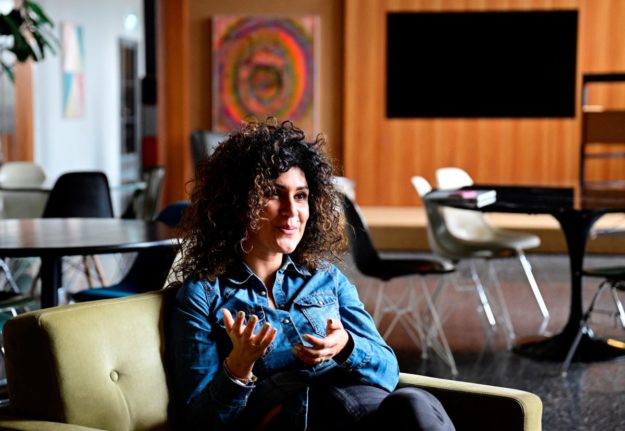If anyone is equipped to talk about discrimination again Muslims in Europe, it would be author and filmmaker Melina Borčak.
A Muslim from Bosnia, she was born during the genocide by Serbs against Bosnian Muslims, also known as Bosniaks, during the 1990s.
After moving to Germany, she encountered a lot of ignorance about Muslims and even open hostility towards them.
This situation has worsened in the wake of Hamas’ October 7th attacks on Israel, with Islamophobic incidents spiking over the past months and politicians and the media reverting to harmful stereotypes.
Borčak’s new book, “Mekka hier, Mekka da”, argues forcefully against these stereotypes and aims to combat the ignorance of the general public.
Speaking to The Local, she explains what everyday racism looks like for Muslims and what people can do to educate themselves.
READ ALSO: What is Germany’s Islam conference and why is it controversial?
Hi Melina, thanks for talking to us. How does anti-Muslim racism play out in everyday life?
From trying to find an apartment or a job or getting death threats as a journalist, or not being taken seriously as someone who isn’t seen as objective.
In my book, I wrote that I understand why people are misinformed about Islam: no one has the time to read a book about everything. People only know about Muslims what they get from the media.
Many think all Muslims want to kill all non-believers, or they are terrorists because they want 72 virgins in heaven, total nonsense like that. When we talk about “the Muslim world” we put two billion people in one bucket.
Who do you mean by that? My cute elderly neighbour, or a dictator in an Arab country, or the protester risking their life to fight against said dictator, or a punk band in Indonesia? We are humans with our own individuality.
Germany is relatively diverse and politicians have increasingly been talking about it as a “migration country”. Have there been positive changes since you came?
I think there were positive changes, but in the last few weeks there has been a time machine that took us back to the post- 9/11 era. I’ve never seen such a hard and fast return to pure racism.
Twenty years ago we knew it was not right to consider all Muslims terrorists or demand that all Muslims as a collective distance themselves from terrorism.
You’re talking about Vice Chancellor Robert Habeck’s speech, in which he said Muslims in Germany should distance themselves from Hamas?
We don’t demand Christians to distance themselves from the Lord’s Resistance Army or from Serb or Croat nationalists. Why from Muslims? Because they aren’t seen to have individuality and are a gray monolithic mass that is dangerous and uncivilised.
You don’t congratulate me for winning the Nobel prize if a Muslim does it, so why does it only apply when Hamas do something terrible? Habeck’s speech was dripping with racism but it was celebrated as if he was some awesome leader who is making things better, but he threw the entire Muslim community under the bus.

Germans will say they have a historic responsibility towards Israel because of their past.
But my grandparents were not Nazis. Mine were persecuted by the Nazis – my grandfather was an orphan because his parents were killed.
I agree the descendants of Nazis do have a special responsibility. But you can’t force random people who moved to Germany from Kenya to have the same responsibility – then it isn’t special anymore.
READ ALSO: Vice chancellor calls for end of anti-Semitism in Germany in viral video
I don’t get why it’s just about Israel. It should be a responsibility towards Jewish people – there are Holocaust survivors being killed in Ukraine because Germany didn’t evacuate them. They could have been saved by Germany to get them out of the warzone but those calls were ignored.
They also have special responsibility to Roma & Sinti, disabled people – honestly to the whole continent of Europe. They picked one issue – a country – and ignored all the Jewish people outside of Israel, left-wing Jewish people, or Poland.
What should people in Germany know about Muslims?
People should know what a Fatwah is, what Sharia is. Fatwah is just a declaration from an Islamic scholar. Indonesia has a lot about protecting nature, Bosnia has a Fatwah protecting queer people.
There is even a Fatwah on how the first Muslim astronaut should pray in space – around 150 Islamic scholars met to discuss that.
Also, there’s no book of Shariah – it’s a set of rules that differs from one set of school of thought to the other. In the Philippines it is the only way for women being abused to get divorced, because [divorce is illegal in the Philippines but] Shariah law allows that. We don’t talk about Shariah when it’s better for women’s rights.
The media gives people wrong definitions. Try to always question the narratives and try to treat us like normal people from all over the world. A Muslim from Indonesia is not the same as from Turkey – generations are different too. We are humans so treat us as such instead of generalising about us.
Melina Borčak’s book “Mekka hier, Mekka da” is out now. This interview was edited for length and clarity.



 Please whitelist us to continue reading.
Please whitelist us to continue reading.
No gaslighting please. Of course all Muslims aren’t … whatever. However, far too high a percentage are deeply anti-Semitic and and either agree with or are indifferent to evil policies like life or death sentences for things like blasphemy or homosexuality. The Koran and the Hadith are as bad as the Bible or Torah, but the difference is literal belief and adherence.